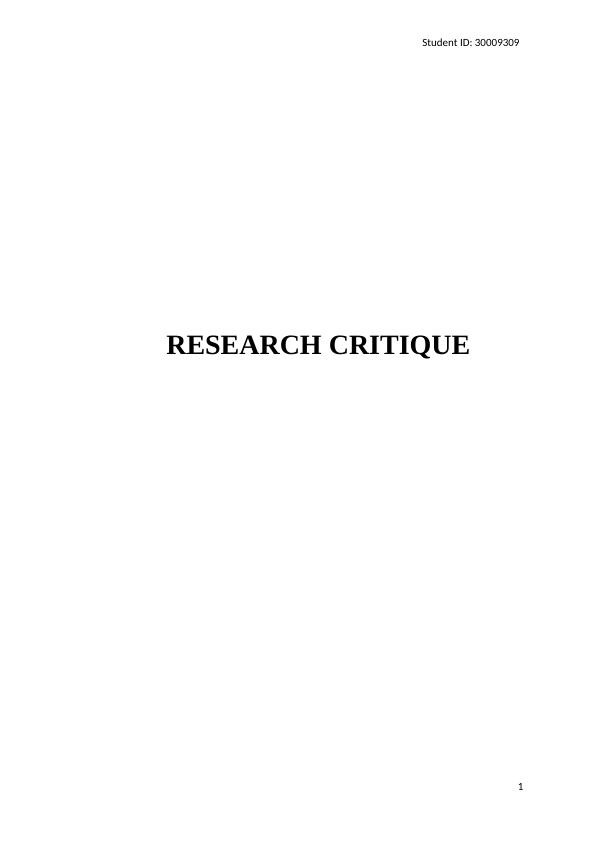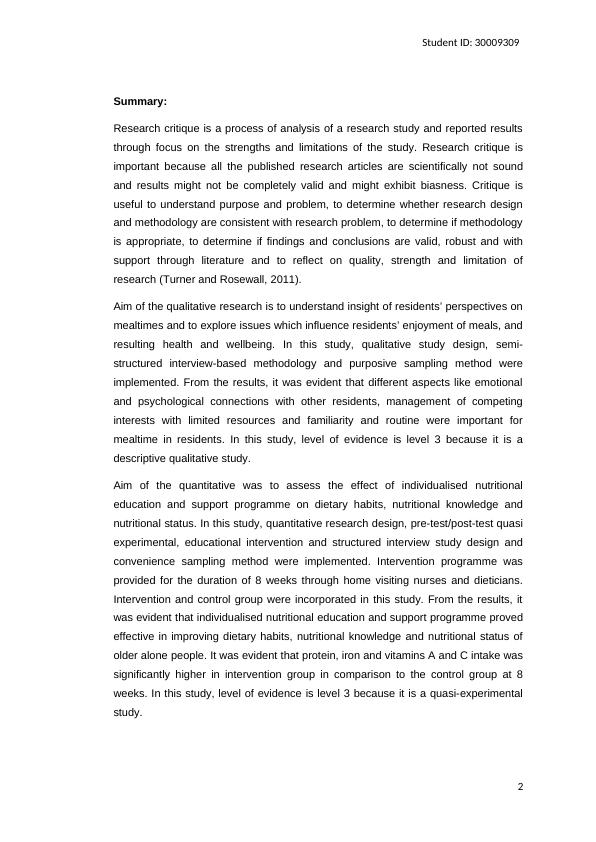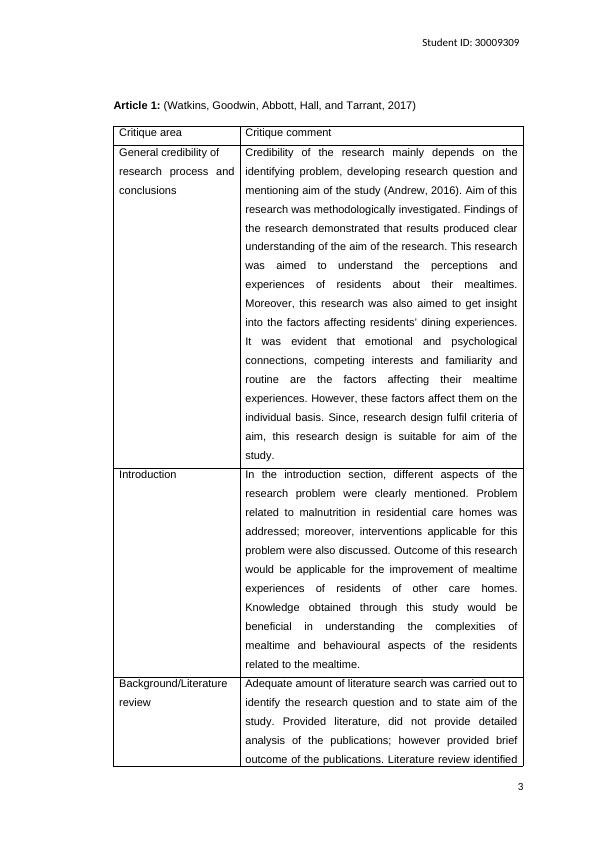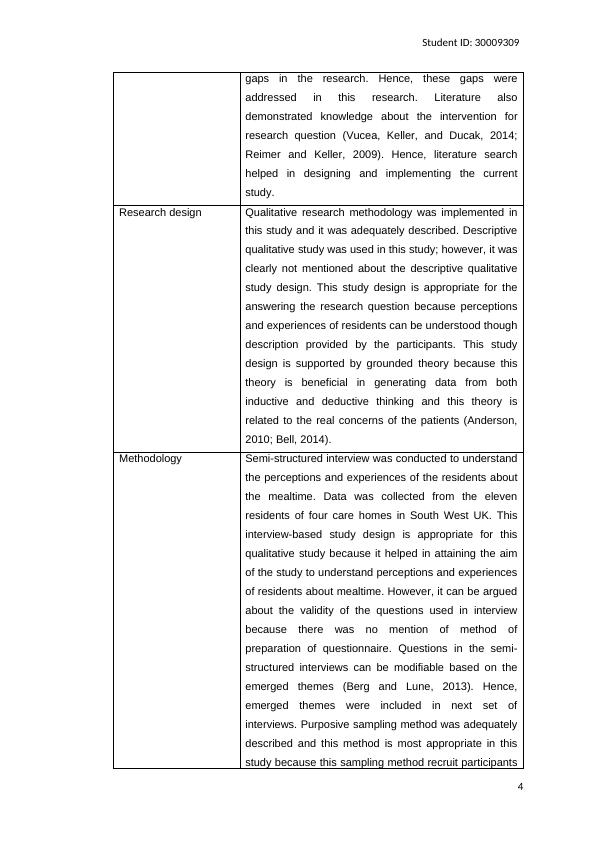Research Critique
Added on 2023-03-20
13 Pages3305 Words90 Views
Student ID: 30009309
RESEARCH CRITIQUE
1
RESEARCH CRITIQUE
1

Student ID: 30009309
Summary:
Research critique is a process of analysis of a research study and reported results
through focus on the strengths and limitations of the study. Research critique is
important because all the published research articles are scientifically not sound
and results might not be completely valid and might exhibit biasness. Critique is
useful to understand purpose and problem, to determine whether research design
and methodology are consistent with research problem, to determine if methodology
is appropriate, to determine if findings and conclusions are valid, robust and with
support through literature and to reflect on quality, strength and limitation of
research (Turner and Rosewall, 2011).
Aim of the qualitative research is to understand insight of residents’ perspectives on
mealtimes and to explore issues which influence residents’ enjoyment of meals, and
resulting health and wellbeing. In this study, qualitative study design, semi-
structured interview-based methodology and purposive sampling method were
implemented. From the results, it was evident that different aspects like emotional
and psychological connections with other residents, management of competing
interests with limited resources and familiarity and routine were important for
mealtime in residents. In this study, level of evidence is level 3 because it is a
descriptive qualitative study.
Aim of the quantitative was to assess the effect of individualised nutritional
education and support programme on dietary habits, nutritional knowledge and
nutritional status. In this study, quantitative research design, pre-test/post-test quasi
experimental, educational intervention and structured interview study design and
convenience sampling method were implemented. Intervention programme was
provided for the duration of 8 weeks through home visiting nurses and dieticians.
Intervention and control group were incorporated in this study. From the results, it
was evident that individualised nutritional education and support programme proved
effective in improving dietary habits, nutritional knowledge and nutritional status of
older alone people. It was evident that protein, iron and vitamins A and C intake was
significantly higher in intervention group in comparison to the control group at 8
weeks. In this study, level of evidence is level 3 because it is a quasi-experimental
study.
2
Summary:
Research critique is a process of analysis of a research study and reported results
through focus on the strengths and limitations of the study. Research critique is
important because all the published research articles are scientifically not sound
and results might not be completely valid and might exhibit biasness. Critique is
useful to understand purpose and problem, to determine whether research design
and methodology are consistent with research problem, to determine if methodology
is appropriate, to determine if findings and conclusions are valid, robust and with
support through literature and to reflect on quality, strength and limitation of
research (Turner and Rosewall, 2011).
Aim of the qualitative research is to understand insight of residents’ perspectives on
mealtimes and to explore issues which influence residents’ enjoyment of meals, and
resulting health and wellbeing. In this study, qualitative study design, semi-
structured interview-based methodology and purposive sampling method were
implemented. From the results, it was evident that different aspects like emotional
and psychological connections with other residents, management of competing
interests with limited resources and familiarity and routine were important for
mealtime in residents. In this study, level of evidence is level 3 because it is a
descriptive qualitative study.
Aim of the quantitative was to assess the effect of individualised nutritional
education and support programme on dietary habits, nutritional knowledge and
nutritional status. In this study, quantitative research design, pre-test/post-test quasi
experimental, educational intervention and structured interview study design and
convenience sampling method were implemented. Intervention programme was
provided for the duration of 8 weeks through home visiting nurses and dieticians.
Intervention and control group were incorporated in this study. From the results, it
was evident that individualised nutritional education and support programme proved
effective in improving dietary habits, nutritional knowledge and nutritional status of
older alone people. It was evident that protein, iron and vitamins A and C intake was
significantly higher in intervention group in comparison to the control group at 8
weeks. In this study, level of evidence is level 3 because it is a quasi-experimental
study.
2

Student ID: 30009309
Article 1: (Watkins, Goodwin, Abbott, Hall, and Tarrant, 2017)
Critique area Critique comment
General credibility of
research process and
conclusions
Credibility of the research mainly depends on the
identifying problem, developing research question and
mentioning aim of the study (Andrew, 2016). Aim of this
research was methodologically investigated. Findings of
the research demonstrated that results produced clear
understanding of the aim of the research. This research
was aimed to understand the perceptions and
experiences of residents about their mealtimes.
Moreover, this research was also aimed to get insight
into the factors affecting residents’ dining experiences.
It was evident that emotional and psychological
connections, competing interests and familiarity and
routine are the factors affecting their mealtime
experiences. However, these factors affect them on the
individual basis. Since, research design fulfil criteria of
aim, this research design is suitable for aim of the
study.
Introduction In the introduction section, different aspects of the
research problem were clearly mentioned. Problem
related to malnutrition in residential care homes was
addressed; moreover, interventions applicable for this
problem were also discussed. Outcome of this research
would be applicable for the improvement of mealtime
experiences of residents of other care homes.
Knowledge obtained through this study would be
beneficial in understanding the complexities of
mealtime and behavioural aspects of the residents
related to the mealtime.
Background/Literature
review
Adequate amount of literature search was carried out to
identify the research question and to state aim of the
study. Provided literature, did not provide detailed
analysis of the publications; however provided brief
outcome of the publications. Literature review identified
3
Article 1: (Watkins, Goodwin, Abbott, Hall, and Tarrant, 2017)
Critique area Critique comment
General credibility of
research process and
conclusions
Credibility of the research mainly depends on the
identifying problem, developing research question and
mentioning aim of the study (Andrew, 2016). Aim of this
research was methodologically investigated. Findings of
the research demonstrated that results produced clear
understanding of the aim of the research. This research
was aimed to understand the perceptions and
experiences of residents about their mealtimes.
Moreover, this research was also aimed to get insight
into the factors affecting residents’ dining experiences.
It was evident that emotional and psychological
connections, competing interests and familiarity and
routine are the factors affecting their mealtime
experiences. However, these factors affect them on the
individual basis. Since, research design fulfil criteria of
aim, this research design is suitable for aim of the
study.
Introduction In the introduction section, different aspects of the
research problem were clearly mentioned. Problem
related to malnutrition in residential care homes was
addressed; moreover, interventions applicable for this
problem were also discussed. Outcome of this research
would be applicable for the improvement of mealtime
experiences of residents of other care homes.
Knowledge obtained through this study would be
beneficial in understanding the complexities of
mealtime and behavioural aspects of the residents
related to the mealtime.
Background/Literature
review
Adequate amount of literature search was carried out to
identify the research question and to state aim of the
study. Provided literature, did not provide detailed
analysis of the publications; however provided brief
outcome of the publications. Literature review identified
3

Student ID: 30009309
gaps in the research. Hence, these gaps were
addressed in this research. Literature also
demonstrated knowledge about the intervention for
research question (Vucea, Keller, and Ducak, 2014;
Reimer and Keller, 2009). Hence, literature search
helped in designing and implementing the current
study.
Research design Qualitative research methodology was implemented in
this study and it was adequately described. Descriptive
qualitative study was used in this study; however, it was
clearly not mentioned about the descriptive qualitative
study design. This study design is appropriate for the
answering the research question because perceptions
and experiences of residents can be understood though
description provided by the participants. This study
design is supported by grounded theory because this
theory is beneficial in generating data from both
inductive and deductive thinking and this theory is
related to the real concerns of the patients (Anderson,
2010; Bell, 2014).
Methodology Semi-structured interview was conducted to understand
the perceptions and experiences of the residents about
the mealtime. Data was collected from the eleven
residents of four care homes in South West UK. This
interview-based study design is appropriate for this
qualitative study because it helped in attaining the aim
of the study to understand perceptions and experiences
of residents about mealtime. However, it can be argued
about the validity of the questions used in interview
because there was no mention of method of
preparation of questionnaire. Questions in the semi-
structured interviews can be modifiable based on the
emerged themes (Berg and Lune, 2013). Hence,
emerged themes were included in next set of
interviews. Purposive sampling method was adequately
described and this method is most appropriate in this
study because this sampling method recruit participants
4
gaps in the research. Hence, these gaps were
addressed in this research. Literature also
demonstrated knowledge about the intervention for
research question (Vucea, Keller, and Ducak, 2014;
Reimer and Keller, 2009). Hence, literature search
helped in designing and implementing the current
study.
Research design Qualitative research methodology was implemented in
this study and it was adequately described. Descriptive
qualitative study was used in this study; however, it was
clearly not mentioned about the descriptive qualitative
study design. This study design is appropriate for the
answering the research question because perceptions
and experiences of residents can be understood though
description provided by the participants. This study
design is supported by grounded theory because this
theory is beneficial in generating data from both
inductive and deductive thinking and this theory is
related to the real concerns of the patients (Anderson,
2010; Bell, 2014).
Methodology Semi-structured interview was conducted to understand
the perceptions and experiences of the residents about
the mealtime. Data was collected from the eleven
residents of four care homes in South West UK. This
interview-based study design is appropriate for this
qualitative study because it helped in attaining the aim
of the study to understand perceptions and experiences
of residents about mealtime. However, it can be argued
about the validity of the questions used in interview
because there was no mention of method of
preparation of questionnaire. Questions in the semi-
structured interviews can be modifiable based on the
emerged themes (Berg and Lune, 2013). Hence,
emerged themes were included in next set of
interviews. Purposive sampling method was adequately
described and this method is most appropriate in this
study because this sampling method recruit participants
4

End of preview
Want to access all the pages? Upload your documents or become a member.
Related Documents
Effects of Individualized Nutritional Education on Older Adultslg...
|10
|2215
|25
Critical Appraisal in Nurse Education Systematic Reviewlg...
|37
|6671
|186
Critique of a Qualitative Study on Adolescents' Perspectives on Addictionlg...
|8
|2044
|100
School Gardens Enhance Academic Performance and Dietary Outcomes in Childrenlg...
|11
|8517
|104
Nutrition Research: Diet and Cardiovascular Diseaselg...
|11
|2599
|28
Healthy Eating in Early Childhood: A Critical Reviewlg...
|10
|2577
|62
